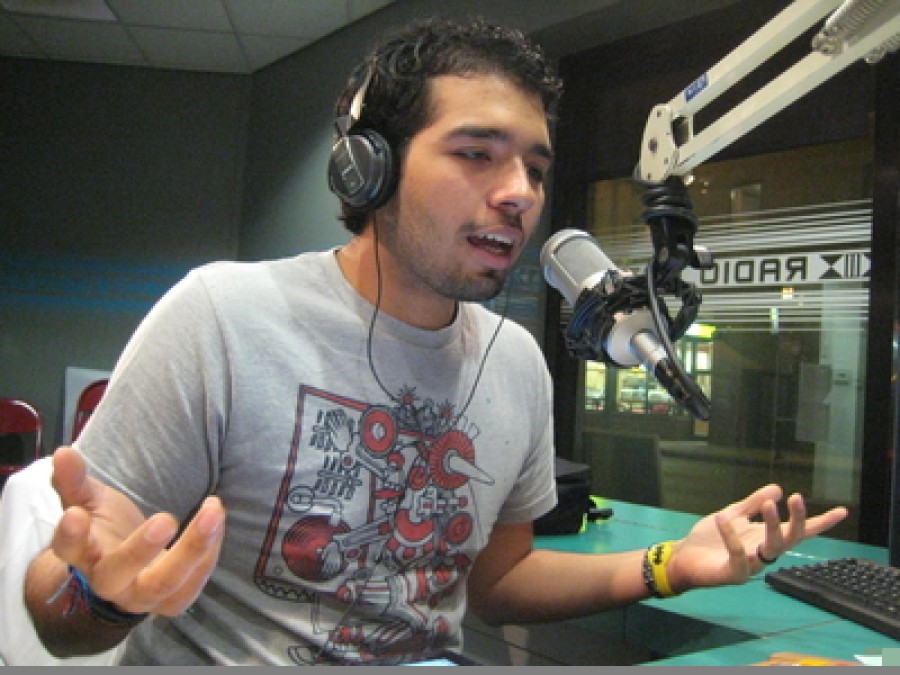Latino youths organize for control of Radio Arte
By Chip Mitchell

Latino youths organize for control of Radio Arte
By Chip MitchellSome young radio producers are organizing for control of the Chicago area’s only noncommercial Latino broadcast outlet.
They’re upset about plans by the National Museum of Mexican Art to sell the building and license of WRTE-FM Chicago (90.5), a youth-run station known as Radio Arte that airs music and public affairs content in English and Spanish.
Transmitting at 73 watts from Little Village, Radio Arte reaches several other Latino neighborhoods of the city’s Southwest Side and some nearby suburbs.
The station also trains hundreds of volunteers a year and puts dozens on the air each week. Some have formed a group to try to keep the station in their community’s hands.
Many of these volunteers share a bond: They don’t have papers to be living in the United States.
“Radio Arte helped me learn to fight back,” said volunteer Adriana Velázquez, 20, who arrived in the Back of the Yards neighborhood from Mexico at age 11.
Velázquez graduated from Benito Juárez Community Academy in nearby Pilsen and dreamed of going to college. But her immigration status disqualified her from most financing.
“So I felt like all I had done all these years in high school — being a good student, a good member of the community — was not worth [anything] to people,” she said Thursday.
Velázquez said her life changed in 2008, when she started working on a Radio Arte show, Salud: Healing Through the Arts. “That summer was when I started really talking about my status and sharing that with other students who were also going through my situation,” she said.
“It was kind of a relief to feel [at] home somewhere, not feeling ashamed that I was undocumented,” said Velázquez, now a music-performance student at Northeastern Illinois University.
Velázquez and the other volunteers want control of Radio Arte’s name, license and transmitter. But they haven’t won over museum officials.
President Carlos Tortolero said the volunteers were making too much of the museum’s plans. “Radio, to a lot of funders, is old school,” he said. “And we can still do radio classes without a radio station. A lot of people are streaming now online and podcasting.”
Tortolero said selling the building and radio license would free up resources for projects in other media such as video and computer graphics.
The Radio Arte volunteers counter that terrestrial radio signals still reach much bigger audiences than web streaming and podcasting do. “That’s especially true in immigrant and low-income communities,” Velázquez said.
The license’s market value is not clear. Radio Arte staffers say the museum paid $12,000 for it in 1996.
Tortolero said the museum hasn’t received any offers yet but adds he’s talking with potential buyers, including DePaul University and California-based Radio Bilingüe. He has also met twice with Torey Malatia, chief of Chicago Public Media, the parent of WBEZ.
Interviewed Wednesday, Malatia said his organization would not have cash for the license at this point. But Chicago Public Media is preparing a proposal to “help with operations and costs,” he said.
“We deeply respect Radio Arte’s mission,” Malatia said. “If we get involved, we would keep the tradition alive.”
Malatia said Chicago Public Media would connect Radio Arte to WBEW-FM (89.5), a youth-oriented station known as Vocalo that transmits from Chesterton, Indiana. Vocalo Managing Director Silvia Rivera worked at Radio Arte for more than a decade, including three years as general manager.
If the Chicago Public Media proposal were accepted, Radio Arte likely would continue broadcasting student- and volunteer-run shows, while “primetime blocks would be simulcast” with Vocalo, according to Malatia.
“As this story gets out,” Malatia added, “it puts pressure on DePaul and [Radio Bilingüe] to close the deal, and probably will pull some religious buyers into the mix.”
The building, 1401 W. 18th St., houses Radio Arte’s offices and studios as well as Yollocalli Arts Reach, another youth program of the museum. The wedge-shaped structure has two stories and a partly finished basement. Tortolero said the space totals about 11,000 square feet.
The museum had a real-estate appraiser look over the building this month but Tortolero said his team has not yet set the asking price.
The building stands on the corner of Blue Island Avenue and 18th Street. The intersection includes a Mexican-themed plaza that serves as a cultural anchor of Pilsen, a neighborhood whose Latino population has been shrinking.
The volunteers say they won’t try to buy the building.